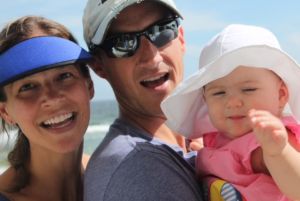 Dr. Elizabeth Hanson Kerr, M.D.
Dr. Elizabeth Hanson Kerr, M.D.
For four years, Elizabeth Hanson Kerr, M.D., and her husband, Richard, waited and wished for a baby.
Under the care of UAB fertility specialist G. Wright Bates, M.D., the couple underwent a series of treatments that finally fulfilled their fondest hopes, when Hanson Elizabeth Kerr was born at UAB’s Women and Infants Center in October 2012.
“I think if I’d have realized how much I wanted to be a mother beforehand, it would have been even tougher,” Dr. Kerr said. “Within an hour of her birth, I told Richard I was ready for number two.”
In gratitude for their baby girl, and in hopes of helping other couples facing fertility challenges, the couple created the Hanson Kerr Endowed Support Fund in Reproductive Endocrinology and Infertility. The endowment provides resources for research and fellowship training in the UAB Division of Reproductive Endocrinology and Infertility.
After graduating from the School of Medicine in 2005, Dr. Kerr completed her residency in anatomic and clinical pathology at UAB in 2007. “In med school, you don't really think about donating; you’re just studying,” says Dr. Kerr, a member of the School of Medicine Alumni Campaign Steering Committee. “But in residency and fellowship, you start to think about the education you are receiving, and how you can give back.
“I decided to donate once I became a patient and realized that my doctor and the fellows weren’t just treating me; they were doing research to find a quicker diagnosis for me, a better way to treat me,” she adds. “And so when they gave us the greatest gift ever, we knew in our hearts we had to give back. It’s not that they just gave us a daughter, but it's the way we were treated, too, with respect and sensitivity that made us feel loved and cared for.”
UAB has the only reproductive endocrinology and infertility fellowship program in the state, and one of only two such programs in the Southeast. Three fellows each year receive advanced training in endoscopic and microsurgical surgery, in vitro fertilization and other fertility treatments.
“We got what we came for,” Dr. Kerr says. “But we wanted to help make that miracle happen for someone else. We recently received a personal note from the fellow who is benefitting from our gift, letting us know that our gift has allowed her to do research and present it at a national meeting. It was good to know our gift is being used.
“Our hope is that future couples will be able to receive a baby quicker, that there will be quicker ways for a diagnosis and quicker ways for treatments, so they are blessed with a baby sooner.”